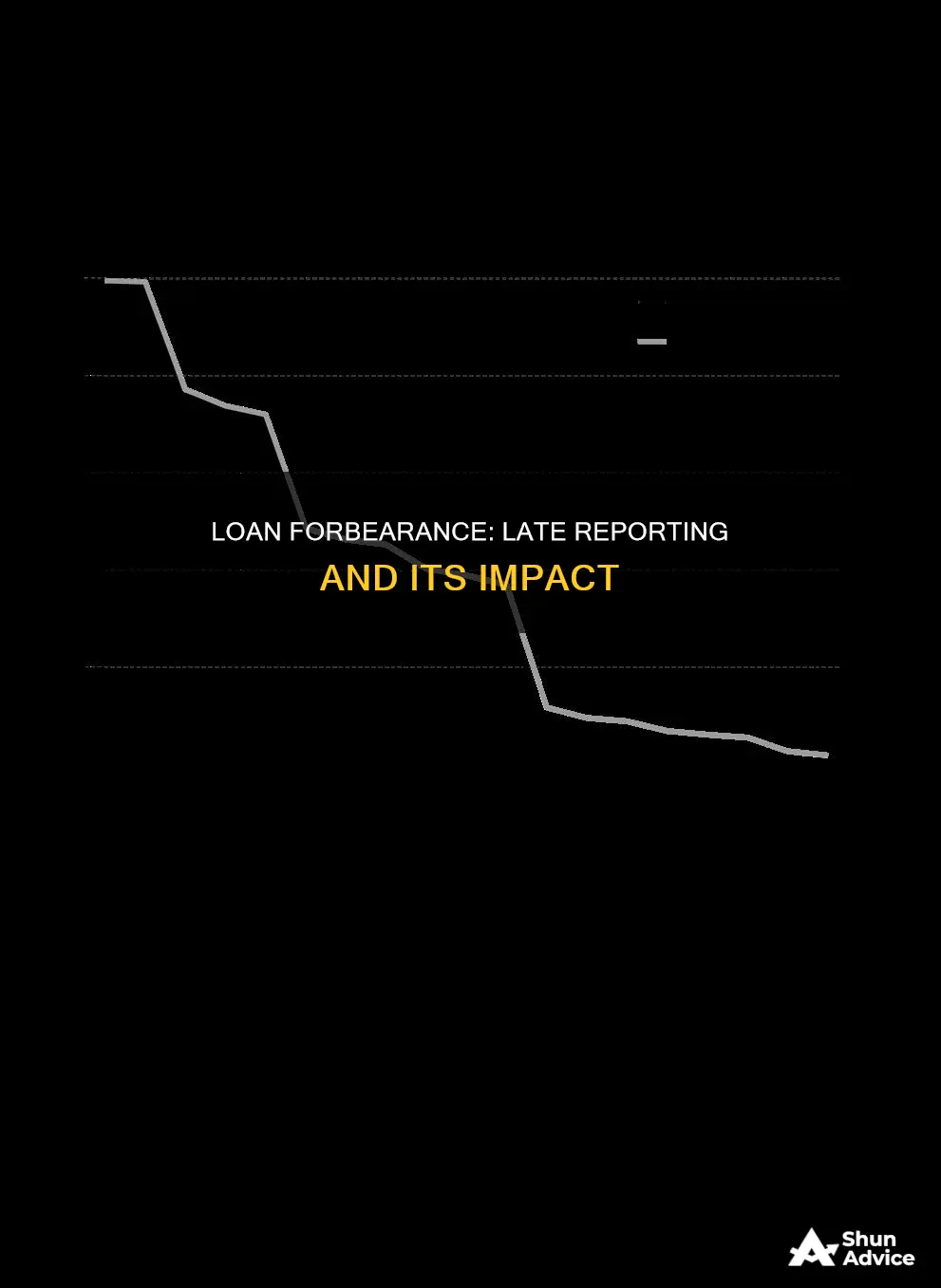
Student loan forbearance is a temporary relief option that allows borrowers to pause their monthly payments. While forbearance can be a financial lifeline, it is important to understand its impact on credit scores and credit reports. During the COVID-19 pandemic, the CARES Act provided federal student loan forbearance, resulting in improved credit scores for borrowers. However, once the forbearance period ends, credit scores may decrease, and missed payments can remain on credit reports for up to seven years. Therefore, borrowers should carefully consider their options and be mindful of the potential long-term consequences on their creditworthiness.
| Characteristics | Values |
|---|---|
| What is student loan forbearance? | A way to temporarily stop or reduce monthly payments if you're facing financial hardship |
| Who is eligible? | Borrowers of federal student loans or private student loans. |
| What are the benefits? | Forbearance can help protect a credit score and provide temporary relief from payments. |
| What are the drawbacks? | Interest continues to accrue on loans, which can increase the overall balance. Late or missed payments may still be included on credit reports. |
| How long does it last? | Federal student loan forbearance has a lifetime cap of three years. |
| What happens after forbearance ends? | Lenders may offer payment accommodations to help borrowers stay current on their loans. |
What You'll Learn

Student loan forbearance can protect your credit score
Student loan forbearance can be a helpful option if you're struggling to make payments on your student loans due to job loss, unexpected medical expenses, or family illness. It is a temporary relief option that allows you to pause or reduce your monthly payments for a specific time period, usually up to 12 months at a time, for a total of three years. During this time, interest continues to accrue on your loans, which is important to consider as it could add thousands of dollars to your loan.
To take advantage of improved credit scores during the forbearance period, you can consider refinancing any debts, including private student loans. However, it's important to understand any fees involved and note that you'll likely need more than just good credit to qualify for refinancing, such as steady employment.
While student loan forbearance can provide temporary relief, it's important to address the underlying circumstances that caused financial hardship in the first place, such as a lack of savings or too much credit card debt. It's also crucial to stick to the agreed-upon schedule for resuming regular payments and making up missed payments during the forbearance period to maintain a good credit standing.
Loan Reports: Impact on Credit Report and Score
You may want to see also

Forbearance can be requested for federal and private loans
Forbearance is a temporary relief option that allows borrowers to pause their monthly payments. It is available for both federal and private loans, although the process and terms may differ. Federal student loans may qualify for either a general or mandatory forbearance. General forbearance, also known as discretionary forbearance, is determined by the loan servicer based on financial hardship, employment status changes, medical expenses, or other approved situations. Mandatory forbearance, on the other hand, is granted if borrowers meet certain eligibility requirements.
Private loan forbearance options depend on the lender and are typically more limited than federal programs. The terms and fees associated with postponing private student loan payments are outlined in the contract and applicable laws, varying across different servicers. It is recommended to contact your private student loan servicer early to discuss these options.
It is important to note that interest continues to accrue on loans during forbearance, and borrowers remain responsible for this interest. While interest on Direct Loans will not be added to the principal balance, other federal loans may include this interest in the total amount owed. To avoid this, borrowers can choose to pay the interest during the forbearance period.
While forbearance can provide temporary relief, it is not a long-term solution. Borrowers should be cautious as the underlying financial issues may not be resolved, and credit scores can decrease once the forbearance period ends. Additionally, it is crucial to stay informed about the resumption of payments to avoid delinquency and negative impacts on credit scores.
Loan Regulations: State-by-State Differences in the USA
You may want to see also

Interest accrues during forbearance, increasing your balance
Forbearance is a temporary relief option that allows borrowers who are facing financial difficulties to pause their monthly payments. While forbearance can be a lifeline for many borrowers, interest continues to accrue on the loan balance during the forbearance period. This means that the borrower's debt increases over time, even while they are not making payments.
Interest accrues daily, in most cases, starting from the day the loan is disbursed. During forbearance, interest accrues on all federal loans and unsubsidized loans. The only loans that do not accrue interest during deferment are subsidized student loans, Perkins loans, and the subsidized portion of Direct or FFEL consolidation loans.
If the borrower does not pay the interest during the forbearance period, it will be capitalized, or added to the principal balance of the loan. This results in the borrower paying interest on the interest that has built up, increasing their total future interest payments. For example, consider a borrower with $35,000 in student loans at a 5.70% interest rate on a 10-year Standard Repayment Plan. If they enter forbearance for one year and pay no interest during that time, a total of $1,995 in interest would accrue. This would be added to the original $35,000 loan balance, resulting in a new loan balance of over $36,995.
To avoid this, borrowers can choose to pay the interest as it accrues during the forbearance period. This option can prevent the total loan balance from increasing and is the most cost-effective option. However, it may not be feasible for everyone, especially if the borrower took out the loan due to a lack of funds.
It is important to note that forbearance may not be the best option for borrowers struggling with their loan payments. While it provides temporary relief, the accruing interest can make the loan more expensive in the long run. Borrowers should consider other options, such as income-driven repayment plans, which can reduce monthly payments without accruing additional interest.
Loan Rejections: Impact on Cibil Scores and Your Credit
You may want to see also

Forbearance can be renewed, but has a lifetime cap of three years
Forbearance is a temporary relief option that allows borrowers to pause their monthly loan payments. This option is available for those facing financial difficulties. While forbearance can be a financial lifeline, it is important to note that interest continues to accrue on the loans during this period.
Federal student loan forbearance typically lasts for 12 months at a time, with the possibility of renewal. However, there is a lifetime cap on this benefit, and borrowers can only pause their monthly payments through forbearance for a maximum of three years. After this period, borrowers will need to resume their payments and find alternative solutions to manage their financial situation.
The process of renewing forbearance involves communicating with the loan servicer or lender. For federal student loans, borrowers may be eligible for a general or mandatory forbearance. General forbearance, also known as discretionary forbearance, is determined by the loan servicer based on the borrower's financial situation. Mandatory forbearance, on the other hand, is granted under specific eligibility requirements, such as serving in the military or participating in a public service program.
It is important to note that the interest on the loans continues to accrue during the forbearance period. As a result, borrowers may end up paying more in interest over time. Additionally, the impact of forbearance on credit scores is complex. While it can provide a temporary boost, as seen during the CARES Act, failing to make payments after the forbearance period can lead to a significant drop in credit scores.
Loan Rehabilitation: A Way to Stop Wage Garnishment?
You may want to see also

Forbearance can be requested for utility bills
Forbearance is a temporary postponement of loan payments, usually for mortgages or student loans. It is granted by lenders as an alternative to foreclosure or default, which can often be costly for them. While forbearance can be a helpful option for those facing financial difficulties, it is important to note that interest continues to accrue on the loans during this period.
It is important to understand the potential impact of forbearance on credit scores. While the CARES Act prevented borrowers' accounts from falling into delinquency and led to an increase in credit scores, this is a temporary measure. Credit scores can decrease once the forbearance period ends if borrowers are unable to resume payments. Therefore, it is crucial to consider the long-term financial implications and explore other options for assistance, such as government programs or refinancing, to manage debt effectively.
When facing financial challenges, individuals can explore various options for relief. Forbearance provides temporary postponement of loan payments, including for utility bills through specific programs. However, it is important to understand the potential consequences, such as accruing interest and the impact on credit scores. Assessing eligibility for government programs and exploring refinancing options can be part of a comprehensive strategy to manage financial hardships effectively.
Frequently asked questions
Yes, your credit score will be affected if you enter into forbearance. While forbearance can help protect your credit score, it is still better for your credit score to make payments on time.
Yes, your credit score will drop if you don't enter into forbearance and are unable to make payments on time. Late or missed payments will be included on your credit report and can cause your credit score to drop by as much as 200 points.
Forbearance can provide temporary relief for borrowers facing financial difficulties by allowing them to reduce or pause their monthly payments. It can also help protect your credit score from the negative impact of late or missed payments.
While forbearance can provide temporary relief, it is not a long-term solution. Interest continues to accrue on your loans during forbearance, which can increase your overall debt. Additionally, the underlying circumstances that caused financial hardship in the first place may not be resolved before the forbearance period ends.







